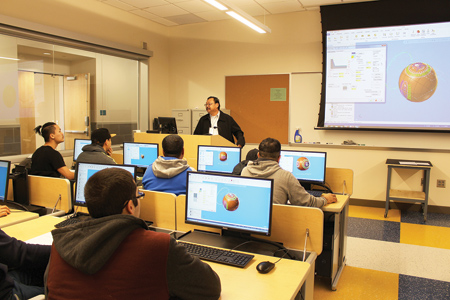
Instructor Tom Nguyen teaches a class in one of Asnuntuck's four CAD/CAM labs
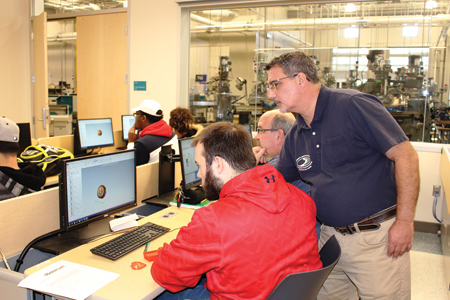
Instructor Michael Lombardi (right) assists a student in a CAD/CAM lab
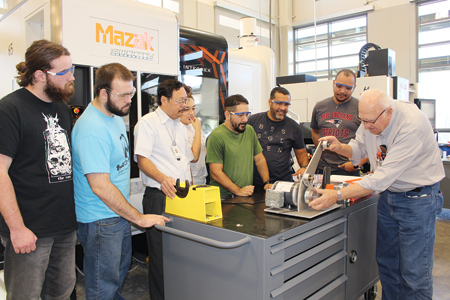
Instructor Bob Bressani (far right) demonstrates a machining set-up for (l-r) Frank Cirullo, John Quinn, Tom Nguyen (a fellow instructor), Marian Claure, Jose Lopez, Adil Sarhrany and Sean Ransom
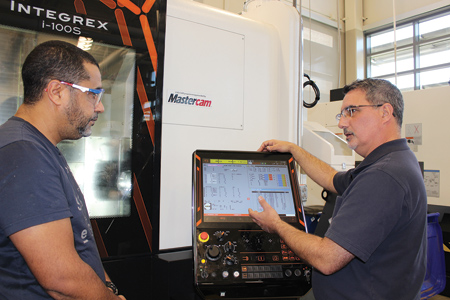
Instructor Michael Lombardi (right) discusses a CNC program with student Adil Sarhrany
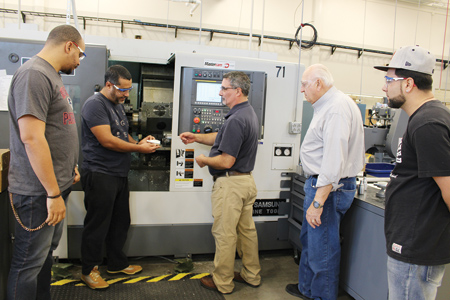
Instructors Michael Lombardi (center) and Bob Bressani (2nd right) review a part machined on a CNC turning center
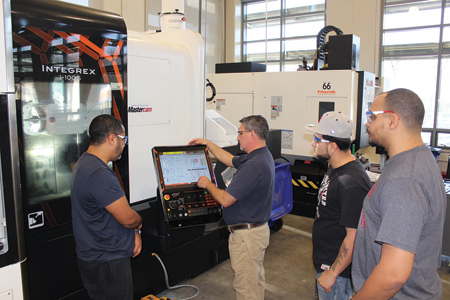
Instructor Michael Lombardi takes students through the steps on a CNC machining center
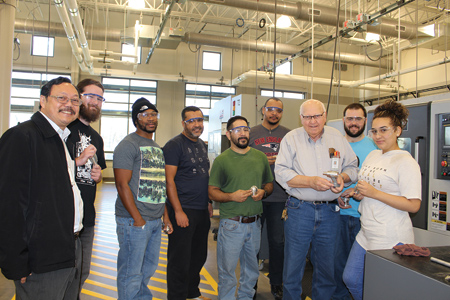
Instructors Tom Nguyen (left) and Bob Bressani (3rd right) with students in Asnuntuck's Advanced Manufacturing Technology Center
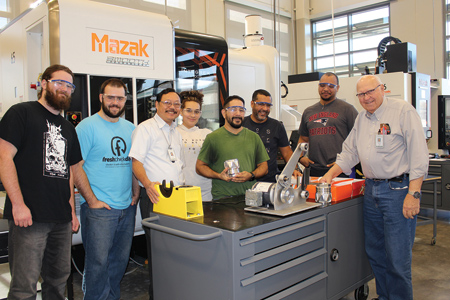
Instructors Bob Bressani (far right) and Tom Nguyen (3rd left) with students at Asnuntuck Community College's Advanced Manufacturing Technology Center
The Advanced Manufacturing program at Asnuntuck Community College in Enfield, CT, offers an educational program designed to attract the attention of those wishing to follow a path toward economic security.
According to veteran educator Frank Gulluni, Director and founder of the college's Advanced Manufacturing Technology Center, "Well over 10,000 people have participated in our programs, including incumbent workers from companies across the state for training in advanced manufacturing operations. We started about 20 years ago as a zero credit after-class activity using some equipment borrowed from Pratt & Whitney. After a few years we earned funding from our state government, bought some more equipment and turned the activity into an actual four-credit program. In the beginning, most of our students were dislocated workers coming to us for training that would help them find available jobs. Now, more than half are enrolling right out of high school with the aim of finding a good career, while the rest are employed people looking to either advance themselves or meet the increasingly demanding skills required by their employers."
Today, some 50,000 sq. ft. of space at the college is dedicated to the Advanced Manufacturing Technology Center, housing dozens of CNC machine tools including machining and turning centers with up to 5-axis capabilities, as well as machines for EDM, plasma cutting, waterjet cutting, 3-D printing and sheet metal fabrication, along with 60 booths for teaching welding operations.
"We also have an electromechanical program," added Gulluni. "In that program, we teach CNC maintenance and repair, together with myriad other electromechanical skills sets. Students are required to establish core CNC programming and editing skills along with industrial motor controls, pneumatics and hydraulics, circuit theory and PLC."
The Center incorporates more than 25,000 sq. ft. of manufacturing lab space, along with seven classrooms, four computer labs and a metrology lab equipped with several coordinate measuring machines (CMMs) and equipment for destructive and non-destructive testing.
"Students in the CNC machining program can take a few targeted courses required by their current employers, or earn 34 credits toward an associate's degree, six of which are in Mastercam-based CNC, along with such subjects as SOLIDWORKS, blueprint reading, metrology, quality assurance, math through trigonometry, and upwards of 600 hours of floor time at the machines," said Gulluni. "With the associate's degree, our graduates experience the immediate reward of a long-term career opportunity in one of Connecticut's manufacturing companies. Starting salaries can range from $16 all the way up to $33 an hour, depending on the employer and the mandated skill sets. They can also matriculate to a pathway system leading to four-year degrees in our state university system."
From the very onset of the program, as Gulluni was setting up the curriculum, the college brought on board Bob Bressani to teach CNC operations. While Gulluni had an extensive background in teaching, Bressani's bio includes management positions in several manufacturing companies. He immediately began establishing a flexible curriculum in CNC operations to meet the needs of the area's machining companies.
"We did a survey of those companies when we first set up our CNC capabilities," said Bressani. "They told us what types of machines they used, as well as the CNC software they preferred. As a result, we obtained some CNC mills and lathes to start, plus SOLIDWORKS software for our design work and Mastercam software for programming our machines. Our facilities list has certainly grown since the early days. We now have dozens of Bridgeport CNC machining centers and Hardinge CNC turning centers on the shop floor. In all, we have more than 90 machine tools available to our students. We have 100 computers networked in our four labs, with 25 seats of Mastercam in each lab. There are seven instructors with manufacturing backgrounds on staff, teaching CNC machining and related subjects to more than 150 current Asnuntuck students."
The students are broken into several groups, each with an instructor for the classroom and machine lab. The shop floor often takes on the personality of a very busy manufacturing company with cells of supervised employees. Once instructors feel their charges are comfortable with the machines, they back off and let the students set up and operate the machine tools while they serve in an advisory capacity until the next step in the lesson plan.
The CNC curriculum begins in the first semester with machine orientation that includes feeds, speeds and tooling set-ups and proceeds to lessons in design and practical experience with vertical machining centers (VMCs) and 2-axis lathes.
"Our objective at this point is to get people to be able to handle set-ups on various machines and to establish a solid foundation in related math, blueprint reading and metrology," said Bressani. "In the second semester, we get into toolpath programming for up to 4-axis CNC operations together with trig, GD&T, QA and CMM."
The program just added lathes with live tooling and bar feeders to expand their students' skills. For students who choose to remain for a third semester, the college provides advanced programming instruction with operations on a 5-axis lathe and two 5-axis machining centers.
"Overall, our students progress from not knowing a thing, to Cartesian coordinates, to getting a part into Mastercam either by importing it from SOLIDWORKS or by actually drawing it in Mastercam, and producing the toolpath code," said Bressani. "I like Mastercam because it is easy to learn and use, even for complex 5-axis parts. There are hundreds of companies in Connecticut doing subcontract work for some big firms like Pratt & Whitney and they tell us that they will take a drawing generated by a variety of CAD systems and drop it into Mastercam for their machines. I really like the High Speed and Dynamic Milling features because they help our students get through difficult jobs and shorten production time."
In addition to providing an education for the school's own students, Asnuntuck Community College also responds to the needs of many of the smaller companies doing subcontracting work for the big firms. They send employees to Asnuntuck Community College to take advantage of the training capabilities of the Advanced Manufacturing program. These companies discuss in detail with Gulluni and his team the skills required for the specific jobs to be performed by their employees. Programs at the school are then tailored to the specific needs and run from as few as two to as many as 78 weeks.
"What we do is determine what they are looking for in the way of manufacturing skills, and put together a package," said Bressani. "That becomes the lesson plan. We do not just take it out of a one-size-fits-all book."
The school also sends instructors from the Advanced Manufacturing program to many of the larger companies to teach their employees right at the plant. In the same manner, discussions are held with the companies' managers and supervisors and lesson plans are developed for the on-site instruction sessions.
As for proof of accomplishment, according to Bressani, "every incumbent worker, whether enrolled in a two-week machine tool operations course or a 640-hour electromechanical program, gets a certificate spelling out exactly what skill sets we provided. Because major employers like Pratt & Whitney, Electric Boat and Sikorsky are ramping up to hire thousands of new workers over the next few years, they will be coming to our program at Asnuntuck for these employees and for a very good reason. With our expanded facilities, we can supply even greater numbers of well-educated women and men and ensure a win-win situation for everyone."
The college has also taken steps to ensure a steady flow of talented youth into the Advanced Manufacturing program. "We have a College Connections Program aimed at juniors and seniors in high school," said Gulluni. "This is part of our Seeding the Future Workforce effort. We will eventually have more than 200 youth here on a daily basis from several surrounding communities. They leave their schools at 11:30 in the morning and come here for the rest of the afternoon, enrolled in our machining, welding and electromechanical programs. They identify one of these programs and remain there for one to four semesters, six to eight hours weekly, for the 36-week school year. They are earning college credit as well as high school credit. The hope is that, after graduation, they will matriculate here for Advanced Manufacturing."
Asnuntuck's unique Fifth Year Program starts after graduation from high school and has been developed so that the student can complete the additional academic and technology requirements in 12 to 18 months, earning an Associate in Science degree in advanced manufacturing technology.
"We also have a program for surrounding middle and early high school students, beginning with fifth and sixth graders and continuing through the tenth grade," said Gulluni. "Instructors from our college go to those schools to teach the basics in CNC machining, CAD, 3-D printing and robotics. We are trying to influence kids as early as we can, as well as their parents and educators. We want them to understand that manufacturing is definitely a career path well worth pursuing."
For more information contact:
Asnuntuck Community College
170 Elm Street
Enfield, CT 06082
860-253-3000
info@asnuntuck.edu
www.asnuntuck.edu